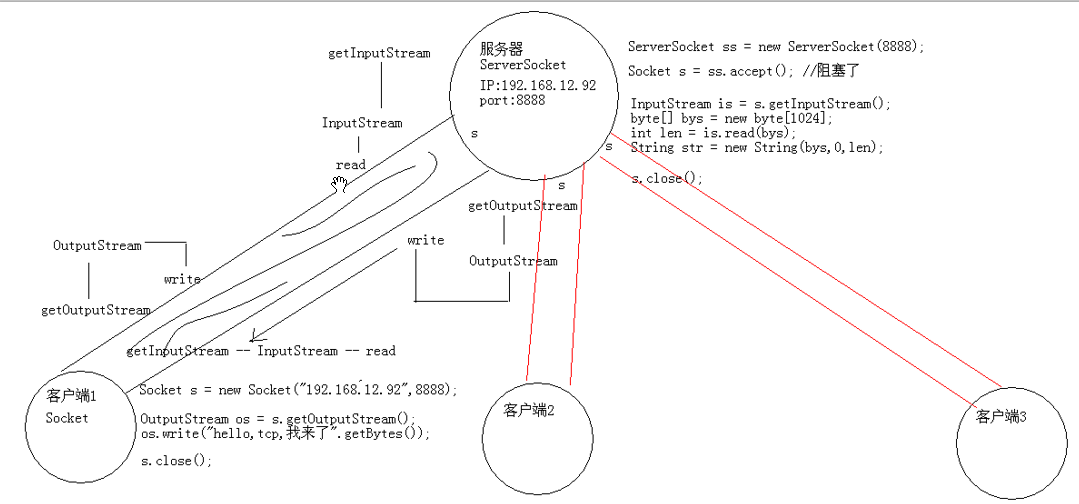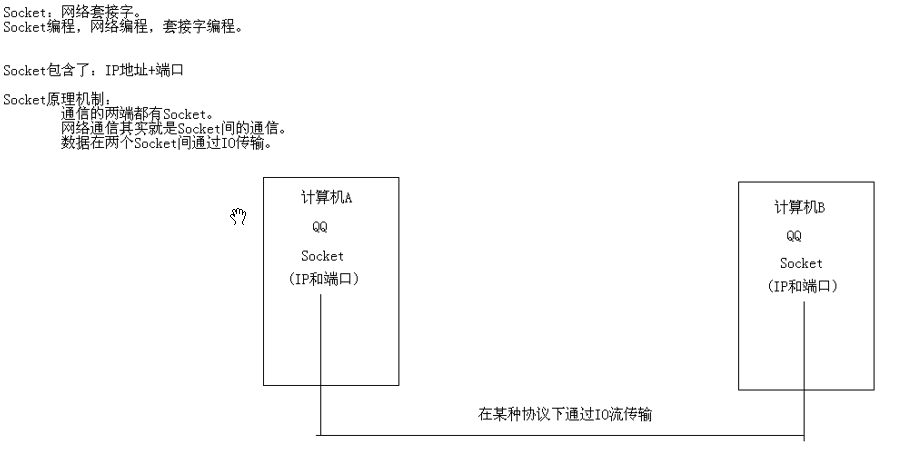java网络编程:
网络编程:用Java语言实现计算机间数据的信息传递和资源共享;
计算机网络:实现多台计算机之间的数据交互,网络通信;
网络编程的三要素:
1:IP地址:网络中计算机的唯一标识。IP地址的组成:网络号段+主机号段
2:端口:正在运行的程序的标识。有效端口:0~65535,其中0~1024系统使用或保留端口。
3:网络协议:
UDP:把数据打包;数据有限制;不建立连接;速度快; 不可靠,数据可能丢失。
TCP:建立连接通道; 数据无限制; 速度慢; 可靠。
1:UDP协议发送、接收数据图解:

2:TCP发送、接收数据图解:

3:socket通信原理图解:

1:UDP协议发送、接收数据代码实现:
发送:

1 /* 2 * UDP协议发送数据: 3 * A:创建发送端Socket对象 4 * B:创建数据,并把数据打包 5 * C:调用Socket对象的发送方法发送数据包 6 * D:释放资源 7 */ 8 public class SendDemo { 9 public static void main(String[] args) throws IOException { 10 // 创建发送端Socket对象 11 // DatagramSocket() 12 DatagramSocket ds = new DatagramSocket(); 13 14 // 创建数据,并把数据打包 15 // DatagramPacket(byte[] buf, int length, InetAddress address, int port) 16 // 创建数据 17 byte[] bys = "hello,udp,我来了".getBytes(); 18 // 长度 19 int length = bys.length; 20 // IP地址对象 21 InetAddress address = InetAddress.getByName("192.168.12.92"); 22 // 端口 23 int port = 10086; 24 DatagramPacket dp = new DatagramPacket(bys, length, address, port); 25 26 // 调用Socket对象的发送方法发送数据包 27 // public void send(DatagramPacket p) 28 ds.send(dp); 29 30 // 释放资源 31 ds.close(); 32 } 33 }
接收:

1 /* 2 * UDP协议接收数据: 3 * A:创建接收端Socket对象 4 * B:创建一个数据包(接收容器) 5 * C:调用Socket对象的接收方法接收数据 6 * D:解析数据包,并显示在控制台 7 * E:释放资源 8 */ 9 public class ReceiveDemo { 10 public static void main(String[] args) throws IOException { 11 // 创建接收端Socket对象 12 // DatagramSocket(int port) 13 DatagramSocket ds = new DatagramSocket(10086); 14 15 // 创建一个数据包(接收容器) 16 // DatagramPacket(byte[] buf, int length) 17 byte[] bys = new byte[1024]; 18 int length = bys.length; 19 DatagramPacket dp = new DatagramPacket(bys, length); 20 21 // 调用Socket对象的接收方法接收数据 22 // public void receive(DatagramPacket p) 23 ds.receive(dp); // 阻塞式 24 25 // 解析数据包,并显示在控制台 26 // 获取对方的ip 27 // public InetAddress getAddress() 28 InetAddress address = dp.getAddress(); 29 String ip = address.getHostAddress(); 30 // public byte[] getData():获取数据缓冲区 31 // public int getLength():获取数据的实际长度 32 byte[] bys2 = dp.getData(); 33 int len = dp.getLength(); 34 String s = new String(bys2, 0, len); 35 System.out.println(ip + "传递的数据是:" + s); 36 37 // 释放资源 38 ds.close(); 39 } 40 }
2:TCP协议发送、接收数据代码实现:
发送:

1 /* 2 * TCP协议接收数据: 3 * A:创建接收端的Socket对象 4 * B:监听客户端连接。返回一个对应的Socket对象 5 * C:获取输入流,读取数据显示在控制台 6 * D:释放资源 7 */ 8 public class ServerDemo { 9 public static void main(String[] args) throws IOException { 10 // 创建接收端的Socket对象 11 // ServerSocket(int port) 12 ServerSocket ss = new ServerSocket(8888); 13 14 // 监听客户端连接。返回一个对应的Socket对象 15 // public Socket accept() 16 Socket s = ss.accept(); // 侦听并接受到此套接字的连接。此方法在连接传入之前一直阻塞。 17 18 // 获取输入流,读取数据显示在控制台 19 InputStream is = s.getInputStream(); 20 21 byte[] bys = new byte[1024]; 22 int len = is.read(bys); // 阻塞式方法 23 String str = new String(bys, 0, len); 24 25 String ip = s.getInetAddress().getHostAddress(); 26 27 System.out.println(ip + "---" + str); 28 29 // 释放资源 30 s.close(); 31 // ss.close(); //这个不应该关闭 32 } 33 }
接收:

1 /* 2 * TCP协议发送数据: 3 * A:创建发送端的Socket对象 4 * 这一步如果成功,就说明连接已经建立成功了。 5 * B:获取输出流,写数据 6 * C:释放资源 7 * 8 * 连接被拒绝。TCP协议一定要先看服务器。 9 * java.net.ConnectException: Connection refused: connect 10 */ 11 public class ClientDemo { 12 public static void main(String[] args) throws IOException { 13 // 创建发送端的Socket对象 14 // Socket(InetAddress address, int port) 15 // Socket(String host, int port) 16 // Socket s = new Socket(InetAddress.getByName("192.168.12.92"), 8888); 17 Socket s = new Socket("192.168.12.92", 8888); 18 19 // 获取输出流,写数据 20 // public OutputStream getOutputStream() 21 OutputStream os = s.getOutputStream(); 22 os.write("hello,tcp,我来了".getBytes()); 23 24 // 释放资源 25 s.close(); 26 } 27 }
实例:
1: 网络编程(UDP协议)多线程实现聊天室:
发送端:
1 public class SendThread implements Runnable { 2 3 private DatagramSocket ds; 4 5 public SendThread(DatagramSocket ds) { 6 this.ds = ds; 7 } 8 9 @Override 10 public void run() { 11 try { 12 // 封装键盘录入数据 13 BufferedReader br = new BufferedReader(new InputStreamReader( 14 System.in)); 15 String line = null; 16 while ((line = br.readLine()) != null) { 17 if ("886".equals(line)) { 18 break; 19 } 20 21 // 创建数据并打包 22 byte[] bys = line.getBytes(); 23 // DatagramPacket dp = new DatagramPacket(bys, bys.length, 24 // InetAddress.getByName("192.168.12.92"), 12345); 25 DatagramPacket dp = new DatagramPacket(bys, bys.length, 26 InetAddress.getByName("192.168.12.255"), 12306); 27 28 // 发送数据 29 ds.send(dp); 30 } 31 32 // 释放资源 33 ds.close(); 34 } catch (IOException e) { 35 e.printStackTrace(); 36 } 37 } 38 39 }
接收端:
1 public class ReceiveThread implements Runnable { 2 private DatagramSocket ds; 3 4 public ReceiveThread(DatagramSocket ds) { 5 this.ds = ds; 6 } 7 8 @Override 9 public void run() { 10 try { 11 while (true) { 12 // 创建一个包裹 13 byte[] bys = new byte[1024]; 14 DatagramPacket dp = new DatagramPacket(bys, bys.length); 15 16 // 接收数据 17 ds.receive(dp); 18 19 // 解析数据 20 String ip = dp.getAddress().getHostAddress(); 21 String s = new String(dp.getData(), 0, dp.getLength()); 22 System.out.println("from " + ip + " data is : " + s); 23 } 24 } catch (IOException e) { 25 e.printStackTrace(); 26 } 27 } 28 29 }
启动发送和接收线程:
1 /* 2 * 通过多线程改进刚才的聊天程序,这样我就可以实现在一个窗口发送和接收数据了 3 */ 4 public class ChatRoom { 5 public static void main(String[] args) throws IOException { 6 DatagramSocket dsSend = new DatagramSocket(); 7 DatagramSocket dsReceive = new DatagramSocket(12306); 8 9 SendThread st = new SendThread(dsSend); 10 ReceiveThread rt = new ReceiveThread(dsReceive); 11 12 Thread t1 = new Thread(st); 13 Thread t2 = new Thread(rt); 14 15 t1.start(); 16 t2.start(); 17 } 18 }
2:TCP协议实现用多线程使用多个客户端上传文件:
客户端:

1 public class UploadClient { 2 public static void main(String[] args) throws IOException { 3 // 创建客户端Socket对象 4 Socket s = new Socket("192.168.12.92", 11111); 5 6 // 封装文本文件 7 // BufferedReader br = new BufferedReader(new FileReader( 8 // "InetAddressDemo.java")); 9 BufferedReader br = new BufferedReader(new FileReader( 10 "ReceiveDemo.java")); 11 // 封装通道内流 12 BufferedWriter bw = new BufferedWriter(new OutputStreamWriter( 13 s.getOutputStream())); 14 15 String line = null; 16 while ((line = br.readLine()) != null) { // 阻塞 17 bw.write(line); 18 bw.newLine(); 19 bw.flush(); 20 } 21 22 // Socket提供了一个终止,它会通知服务器你别等了,我没有数据过来了 23 s.shutdownOutput(); 24 25 // 接收反馈 26 BufferedReader brClient = new BufferedReader(new InputStreamReader( 27 s.getInputStream())); 28 String client = brClient.readLine(); // 阻塞 29 System.out.println(client); 30 31 // 释放资源 32 br.close(); 33 s.close(); 34 } 35 }
服务端:

1 public class UploadServer { 2 public static void main(String[] args) throws IOException { 3 // 创建服务器Socket对象 4 ServerSocket ss = new ServerSocket(11111); 5 6 while (true) { 7 Socket s = ss.accept(); 8 new Thread(new UserThread(s)).start(); 9 } 10 } 11 }
